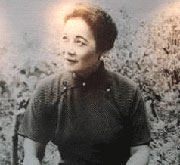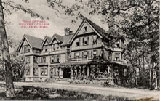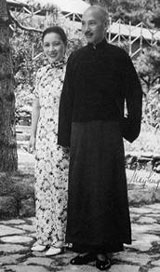|
 Madame
Chiang Kai-shek, once the most powerful woman in China, has died
aged 106 at her home in New York, Taiwan officials said Friday. Madame
Chiang Kai-shek, once the most powerful woman in China, has died
aged 106 at her home in New York, Taiwan officials said Friday.
The beautiful, iron-willed woman
was feared for decades as a formidable force behind her husband,
Chinese Nationalist Generalissimo Chiang Kai-shek.
"We were told that Madame Chiang passed away at about 11 something
last night," said Andrew Hsia, an official of the Taipei Economic
and Cultural Office in New York.
"We were told that she passed away very peacefully while she
was resting," he said.
Madame Chiang had been treated for cancer and other ailments.
After her husband's death in 1975, she spend most of the time in
her Manhattan apartment or at her family's estate in Lattingtown,
an exclusive Long Island suburb 56 kilometers east of New York City.
Madame Chiang and her husband, Chiang Kai-shek, were once one of
the world's most famous couples. They married in 1927, one year
after Mr. Chiang, also known as the Generalismo, took over China's
ruling Nationalist Party.
 She
was born Soong Mei-ling in 1898, on the southern Chinese island
of Hainan. Her family's background could stand as a brief history
of modern China as seen through revolution, efforts to unify and
modernize, and the split between the Chinese mainland and Taiwan. She
was born Soong Mei-ling in 1898, on the southern Chinese island
of Hainan. Her family's background could stand as a brief history
of modern China as seen through revolution, efforts to unify and
modernize, and the split between the Chinese mainland and Taiwan.
Her father, Charles Soong, was educated as a Christian
missionary at Vanderbilt University
in Tennessee. Soong worked closely with Dr. Sun Yat-sen,
leader of the Nationalist revolution that overthrew China's last
emperor in 1911.
Education was important to Soong, and Madame Chiang and her two
sisters were among the first Chinese women educated in the West
at a time when foreign education was considered important only for
sons.
A scholar at heart, Madame Chiang once said her idea of happiness
would be a life of uninterrupted reading, studying and writing.
 Madame
Chiang met her husband, a disciple of Sun Yat-sen, around 1920,
and married him Dec. 1, 1927. She later converted him to Methodism,
but their marriage was often stormy, in part because of Chiang's
infidelities. Madame
Chiang met her husband, a disciple of Sun Yat-sen, around 1920,
and married him Dec. 1, 1927. She later converted him to Methodism,
but their marriage was often stormy, in part because of Chiang's
infidelities.
Madame Chiang's sisters also married prominent Chinese figures.
Ching-ling, the second of six Soong children, married Sun Yat-sen,
the father of modern China. She broke with the family's Nationalist
ideology and sided with the Communist Party after her husband's
death in 1925.
She was appointed to a high-ranking position in the central government
in Beijing, one equivalent to vice president. Madame Sun died in
1981.
Madame Chiang was a working wife, taking on tasks ranging from
interpreter and social worker to head of China's air force during
World War II, an ironic twist of fate since she suffered greatly
from air sickness.
She was also one of her husband's most prominent lobbyists in Washington.
The Generalismo could not speak English and disliked dealing with
foreigners, so his wife became his spokesman for the outside world.
In one of her most famous U.S. public appearances, she addressed
the U.S. Congress in 1943 in her perfect English, her slender figure
dressed in stunning black traditional
Chinese dress. She tried to convince Congress that defeating Japan
was more important than stopping Germany, and that U.S. forces should
concentrate more on battling the Japanese in China.
Madame Chiang and her husband had no children of their own.
|
